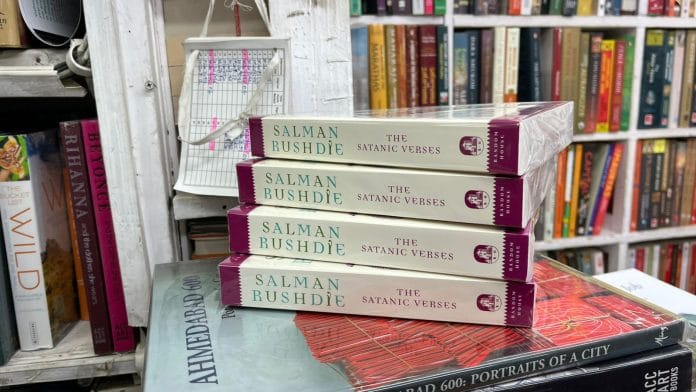New Delhi: The book that resulted in a fatwa, forced one of the world’s most celebrated writers to go into hiding and become a victim of a vicious knife-attack, and led to the assassination of Japanese translator Hitori Igarashi is now back in stores. Salman Rushdie’s The Satanic Verses has been given prime real estate in Khan Market’s Bahrisons, and while it’s not exactly flying off the shelves—it’s still doing pretty well.
But with every check-out of the book at the cash counter, the so-called Khan Market Consensus on this issue is breaking.
The import ban was lifted last month by accident—after the court order went mysteriously missing. But it quietly made its way back onto shelves only yesterday. It’s a firm consensus by the frequenters of Delhi’s Khan Market—The Satanic Verses needs to be bought. Not so much due to its literary virtues but because of sheer curiosity and the titillating desire to get to the bottom of why the Rajiv Gandhi government banned it in 1988.
“I have to read it. There’s too much hype. I haven’t been able to get my hands on it since childhood,” said Gaurav Chaudhuri, a lawyer and weekly visitor to the market. “Why did the government ban it?”
Chaudhuri entered the largely tranquil Faqir Chand bookstore with a single demand. The Satanic Verses. Only to be met with disappointment—and a beeline to Bahrisons. Currently, among Delhi’s smattering of independent bookstores, the book is only available at Bahrisons. While the Faqir Chand bookstore said it wasn’t planning on acquiring it, the Bookshop Inc in Lodhi Colony has placed an order.
Buying a banned book, even if it’s no longer contraband, doesn’t come cheap. The Satanic Verses, published by RandomHouse in the US, is priced at Rs 1,999. Currently, there’s no local edition available. It’s a paperback copy, pages thin and font small.
Out of curiosity
Copies have been strategically placed around the store. It’s in their display, in between bestsellers Butter by Asako Yuzuki and Nobel laureate Han Kang’s The Vegetarian, and at their payment counter—next to Anuj Bahri and Aanchal Malhotra’s Bahrisons: Chronicle of a Bookshop. Essentially, it’s impossible to miss.
“The ban was lifted, so why wouldn’t we sell it?” said Rajni Bahri, owner of Bahrisons. “It’s like any other book we have. The demand is there. I think people have been wanting to read it for a very long time.”
Except, it isn’t. At the store, there are no die-hard Rushdie fans, longing to add the missing piece to their collection. Instead, those who bought the book were driven more by curiosity.
“I’m just curious and the book is all around the shop,” said Deepanshu, an artist. “When something’s banned, you just want to read it more.” It’s his first Rushdie purchase.
He declined to discuss the book further. After all, he is yet to read it. “This is all surface-level,” he added gravely. He won’t know until he reads it.
Meanwhile, those who have read the Verses weren’t too impressed. Sunil Kumar Marwaha, a consultant, said there’s nothing sensational in the book.
“I couldn’t find anything. I have the hardbound,” he confessed. He prefers Haruki Murakami’s magical realism.
The Satanic Verses isn’t available on Amazon India either, much to the chagrin of certain readers, who walked out after checking how much the book costs. But the fascination is there.
“People were shocked at seeing the book. They couldn’t believe it,” said Mithilesh, who works at Bahrisons.
The frenzy around the The Satanic Verses is yet to enter a necessary domain—its content.
“Nobody is talking about the plot or the summary. I would be more keen to see how people react to the book itself,” said Bahri.
(Edited by Prashant)







Have never really been a fan of magical realism. But this book stands apart. My favourite Salman Rushdie novel.
If only the haters had read the book, the issue would not have started in the first place. The primary culprit for the idiotic ban on this beautiful book was Syed Shahabuddin.
Shahabuddin represented the typical Indian Muslim. He started off his political career as a, wait-for-it, “communist”. Was a member of the CPI students’ wing AISF. All through his life he was a rabid communalist and fanatic – a man who took extremely regressive positions on every single issue concerning the Muslim community. Be it the Shah Bano case or the Babri Masjid issue, he championed the cause of fundamentalist and fanatic Islam.